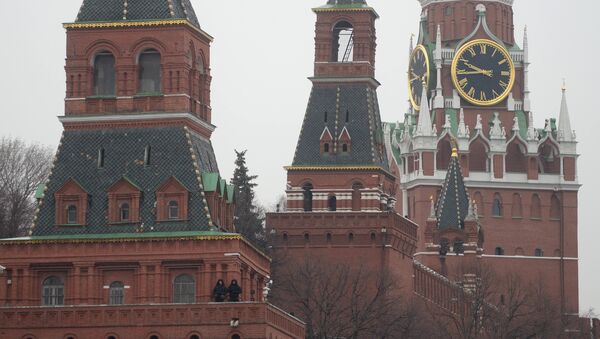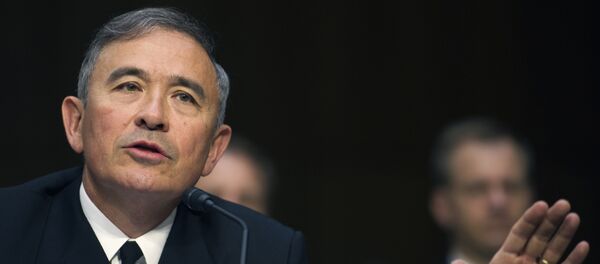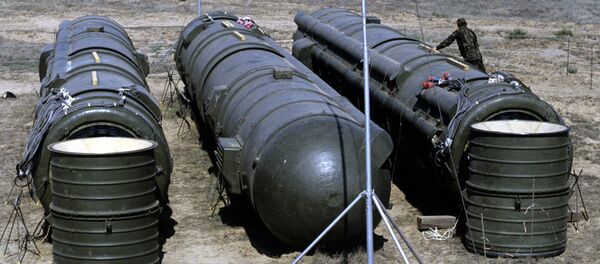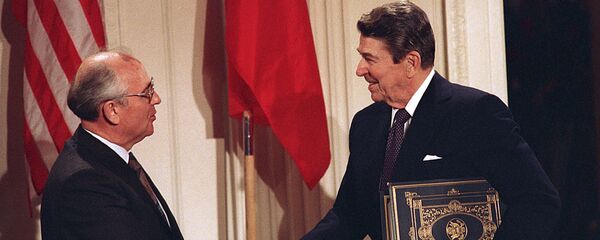In February, Senator Tom Cotton proposed new legislation which enables INF-range missile systems to be transferred to allies in response to Russia’s alleged violations of the INF Treaty.
The treaty was signed in 1987, with the aim to limit the missile arsenals of the US and the Soviet Union. Within the framework of the deal, the two sides agreed to destroy and not to further develop ground-launched ballistic and cruise missiles that have a range of 500-5,500 kilometers. Since then, both Moscow and Washington have repeatedly accused each other of violations of the bilateral agreement.
In February, US media reported that Russia had deployed nuclear cruise missiles in violation of the INF Treaty. In March, US Joint Chiefs of Staff Vice Chairman Gen. Paul Selva said in a congressional testimony that the United States aims to "look for leverage points" seeking Russia's compliance with the treaty.
Russian Foreign Minister Sergey Lavrov has repeatedly said that Moscow was in full compliance with the INF treaty. According to Lavrov, Moscow had its own concerns over Washington's compliance with the INF Treaty and that the Russian side had repeatedly called on US partners to substantially discuss the most controversial points related to the agreement's implementation.
Retaliatory Measures
"We will closely monitor the actions of our colleagues in Congress and draw conclusions. If the withdrawal from the treaty takes place and entails the military build-up, the new deployment of missiles in Europe, we will not turn a blind eye to it, we will take retaliatory measures," Ozerov told Sputnik.
According to the lawmaker, Washington has no reason to accuse Russia of violating the INF Treaty.
"Russia fulfilled its obligations concerning the elimination of short-range and mid-range missiles. They were destroyed under the supervision of the American side. Russia eliminated 1,000 missiles more than the US," Ozerov said.
He added that US congressmen’s calls can be regarded as an "attempt to continue anti-Russian hysteria."
'Absurd Allegations'
Deputy Chair of State Duma's International Affairs Committee Alexei Chepa told Sputnik that amid the current fight against terrorism it would be a mistake to withdraw from any of the previously signed agreements.
"Currently, US policymakers are often guided not by common sense, but some immediate political interests. The Republicans and the Democrats are making absurd things. Many of their allegations, including on Russia’s meddling in the US election, are harmful to the US policy," Chepa said.
The lawmaker underscored that none of the countries can unilaterally withdraw from the agreement.
"If Washington decides to pull out Moscow will do the same. This will result in disturbing the balance of power," he concluded.
Russia Does Not Want an Arms Race
"No matter what, we will not stand by and watch the US violate disarmament agreements and build up its military force. Russia will take adequate measures in response," the lawmaker said.
Shvytkin noted that unlike Washington Moscow complies with its obligations under the INF Treaty.
"At the same time, the Pentagon has repeatedly violated the agreement, including deploying weapons to Eastern Europe, close to the Russian border. For example, missile defense systems were deployed in Poland and Romania," he said.
Withdrawal Would Not Be Good for US
According to Politico, many American congressmen are against pulling out from the INF Treaty. The Donald Trump administration is currently engaged in fierce debate over the issue. According to Politico, the INF Treaty is a "cornerstone disarmament pact with Russia banning an entire class of nuclear missiles."
The Pentagon and the State Department said that the agreement complies with Washington’s interests. The Pentagon issued a report warning Congress that the unilateral withdrawal from the treaty will not serve the interests of the US.
Many American experts have also spoke out against the initiative.
"It can only lead to greater danger. The chance of blundering into a nuclear conflict is greater [with such missiles] than with long-range missiles because they are not based on our shores," former Secretary of Defense William Perry, who is a member of the Pentagon’s high-level Defense Policy Board, told Politico.
"The whole structure of the arms control regime is in danger of falling apart, and we are going to find ourselves in a nuclear arms race. Before pulling out of the INF Treaty, we need to take a deep breath," said Ambassador Richard Burt, who served as the lead arms control negotiator during the administration of President George H.W. Bush.





